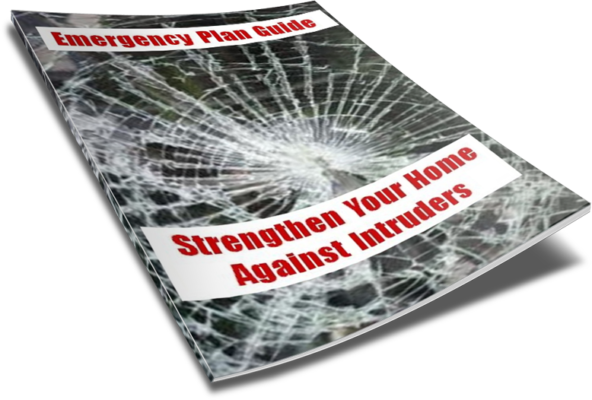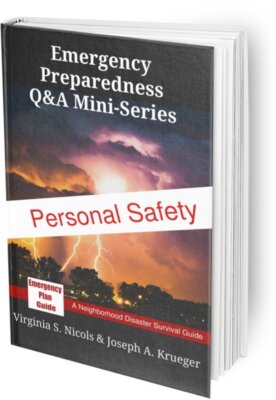Better Home Security

Preparedness is usually more of an attitude than an activity. But today we’re taking a look at actions to take for better home security. Most will require money. Some will require construction skills. We believe all are worth your consideration.
Strengthen Your Home Against Intruders
A Short Report from
Emergency Plan Guide
This Report introduces more ideas for avoiding trouble – what we refer to in the mini-book as the “outer ring” of protection for ourselves and our families.
Every one of actions listed here has to be dealt with before anything happens! in order for them to be effective.
The actions focus on your home. In a major disaster, we hope you can get home safely to shelter in place. But if the disaster lasts a while – like several days or weeks – your safety at home may be tested, as well.
You may be approached by family members, neighbors or strangers looking for assistance. Some of these people will be willing to share, while others will be intent on taking everything you have. You want more ability to handle these interactions.
We’re sure you have already thought about this topic, and we hope this short report gives you the chance to check off each suggestion as “already done.” If not, we’ve included a Personal Action Item List for your use.

(Editor’s note to this Advisory: Our mini-book on Personal Safety was first published the week of July 12, 2020. It may leave you with wanting more practical suggestions for better home security. You can get a head start on the book with this Advisory – so keep reading. Then come back here to get the details on the book!)
Six Steps to Better Home Security
Build an invisible supply of emergency food, tools, etc.
Nearly every one of our books emphasizes the importance of assembling emergency supplies. (Shelter in Place offers a plan for deciding what and how much.) But don’t store all your supplies in one place where someone desperate or determined could take them all!
Spread things around the house and garage, or in your apartment’s storage area. Camouflage by using mis-labeled cardboard boxes, hidden spaces beneath the stairs, or paint pails under a work bench covered with a dirty tarp. A repairman or visitor should not even notice them.
Above all, don’t brag to neighbors about all the effort you’ve put in.
Secure the perimeter to discourage casual trespassers.
We all know that people tend to take the easy way out. This applies to thieves or robbers, too. Don’t let your home be the “easy” target.
Put up a fence to keep people off your property. Install perimeter lighting that will automatically go on if someone trespasses. If you can, invest in a video doorbell to take pictures of anyone on the porch. At the end of the day, bring attractive furniture or toys (particularly bicycles) inside. Get a dog or a recording of a dog barking that you can play before opening the door to a stranger.
You can shutter the house down if you leave, but don’t let it look empty. Keep a car in the driveway, discontinue deliveries, etc. Consider interior lights on a timer.
Strengthen the doors and windows to prevent break-ins.
Most break-ins take place when a burglar or other criminal kicks in your front door. Consider stainless steel reinforcements for frame and hinges. And improve the strength of the deadbolt or replace it altogether. If you rent, and can’t always make these changes, at least invest in a heavy-duty door stop.
Don’t count on the latch of your sliding patio door, either. Use a rod to block it closed. As for windows, you can reinforce the glass with shatter-proof film. And be sure your windows have strong locks that are engaged.
(It’s a good idea to keep shrubs trimmed so they don’t block windows. You don’t want someone to be able to hide there. And you want to be able to get out safely in a fire or other emergency!)
Control any weapons in the home.
If you feel the need to protect your home from violent intruders, pick the right weapons and take responsibility for them. When it comes to firearms, assault-style weapons are usually not the best for home defense. (They are meant for assaulting, remember. And the likelihood of stray bullets striking unintended victims – next door or even down the street — is high.) A shotgun is probably a better choice for more control; you don’t have to be a crack shot to be effective at short or medium range.
Store all weapons so that others in the home – particularly children — will be safe. It should go without saying – become skilled at using your weapons.
Train family members in protection.
If you anticipate a threat, gather your family into a “safe room,” preferably an interior room with few or no windows and access to a bathroom. (You could have some emergency supplies there, too.) Agree on a signal and practice getting everyone into the safe room the minute they hear that signal. (A separate signal might be used to get them OUT of the house.) Teach kids how to call 911. Teach grandma how to text for help. Make preparedness part of your everyday lifestyle.
Build a neighborhood team you can count on.
You will always have a better chance of making it through a dangerous situation with the help of competent neighbors and friends. They are right there. They can take action immediately. This is why we emphasize building a neighborhood group of people who . . .
- You know and feel comfortable with
- Agree with you on the importance of being prepared
- Are willing to share skills, equipment and even their supplies
Building this group takes time and consistent effort. If you like the idea of “strength in numbers,” you’ll agree it’s worth that effort!
Which of the suggestions for better home security in this Report might fit your circumstances? If you want to get started on a checklist, you’ll find one in the PDF version of the Short Report. Download the PDF here.
Virginia
Your Emergency Plan Guide Team
Do you have more suggestions for better home security? This is, after all, a Short Report. Please add comments below!
